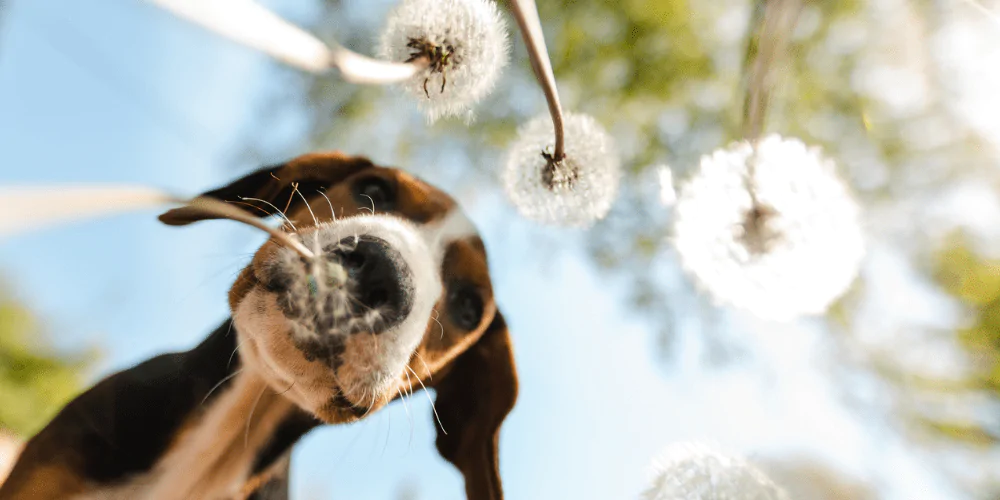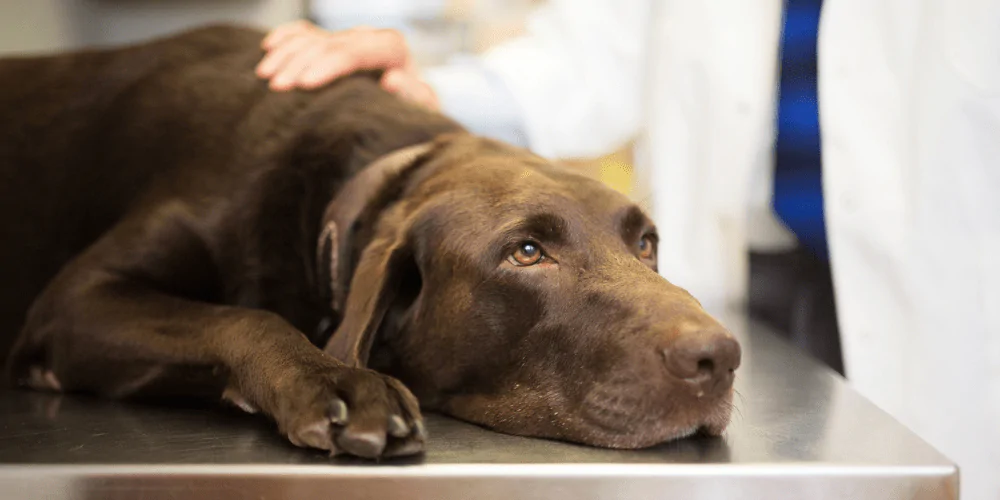
How to recognise and prevent dog poisoning

Dr Scott Miller
5 April 2024 | 5 minutes read
As we know, dogs have a natural curiosity and love to explore with their mouths. But this also means that they can end up eating toxic things around the home.
Poisoning is one of the top conditions that is claimed for via dog insurance.
Join Dr Scott Miller as he explains what common items in the home and garden are poisonous to your pup. Learn how to recognise the symptoms of poisoning and what to do if your dog becomes unwell.
- What plants and flowers are poisonous to dogs?
- Household items that are toxic to dogs
- Dog poisoning symptoms
- How is dog poisoning treated?
> How long does it take for a dog to recover from poisoning? - How to prevent dog poisoning

What plants and flowers are poisonous to dogs?
Some of the most beautiful greenery in and outside of the house can be dangerous for dogs.
This includes (but isn’t limited to):
- Lilies – the peace, Peruvian, and calla varieties are especially dangerous and can cause severe kidney damage within hours.
- Conkers – this seed can lead to vomiting, diarrhoea, drooling, and abdominal pain. In severe cases, it can affect the nervous system.
- Acorns – have tannic acid which leads to stomach upset, including vomiting and diarrhoea. Swallowing large amounts can cause kidney damage.
- Daffodils – the bulb can cause vomiting, diarrhoea, and abdominal pain. Any part of this flower can also lead to drooling, lethargy, and convulsions.
- Ivy – contact with the skin can cause dermatitis while swallowing can lead to diarrhoea, vomiting, and excessive drooling.
- Hydrangeas – can release cyanide when chewed or swallowed, leading to diarrhoea, vomiting, and lethargy. In worst cases, they can cause confusion or lead to seizures.
- Foxgloves – these can affect the heart.
- Azalea/rhododendrons – these contain toxins in the leaves and flowers that can cause vomiting and diarrhoea. In severe cases, they can lead to comas or be fatal.
- Autumn crocus – this can cause respiratory failure and multi-organ damage.
- Lily of the Valley – this causes cardiac problems like reduced heart rate and irregular heartbeats.
- Yew – all parts are toxic, including the berries, and can lead to sudden death.
Surprisingly, dandelions are seen as non-toxic and are even used in some natural remedies for dogs. But it’s always best to check with your vet before giving your pup any plant-based treatments.

Household items that are toxic to dogs
Everyday items that we leave lying around the house can be toxic for your pup.
So it’s important to always be aware of where you place things. Make sure to keep these items out of reach of your dog’s inquisitive nose.
Foods that are harmful to dogs include:
- Chocolate – causes diarrhoea, vomiting, heart issues, and even death in severe cases.
- Xylitol – an artificial sweetener often found in sugar-free gum and sweets, that can lead to hypoglycemia.
- Onions and garlic – cause gastrointestinal irritation and even lead to anaemia.
- Grapes and raisins – even just a few of these can cause kidney failure.
The good news is there are plenty of dog-safe human foods that you can give your pooch as a treat.
Other things to be mindful of around the home are:
- Medications such as paracetamol, ibuprofen, and aspirin – can cause stomach ulcers and kidney damage.
- Cleaning supplies like dishwasher tablets and metal polishes – can lead to chemical burns and gastrointestinal problems.
- Antifreeze – this can be lethal in small amounts and lead to kidney failure.
- Pest control like rodenticides and slug bait – can cause a range of symptoms from seizures to bleeding and neurological effects.

Dog poisoning symptoms
Different types of poison can cause a range of symptoms in dogs. But there are some general signs of poisoning you should look out for, including:
- Vomiting
- Diarrhoea
- Lethargy
- Weakness
- Jaundice
- Bruises or bleeding
Always take your dog straight to the vet if you think they’ve been poisoned as time is of the essence.

How is dog poisoning treated?
In cases of severe poisoning, your vet’s first goal is to help stabilise your dog. This may involve making them vomit if the toxic substance was recently swallowed.
Once your dog is stable, your vet may:
- Run tests such as blood work to assess how much damage there is
- Give your dog fluid for hydration and to flush out toxins
- Use a specific antidote to counter the poison if they know what it is
- Bring their temperature down
- Give oxygen therapy if your dog is struggling to breathe
> How long does it take for a dog to recover from poisoning?
With prompt treatment, dogs can show improvement from mild poisoning within a few hours to a couple of days. More serious poisoning is a longer recovery process, taking several days to weeks for your dog to get better.
If you need to manage any at-home care for your canine, your vet will guide you on what to do. They can also explain how to give your dog medicine.
How to prevent dog poisoning
No one wants to see their dog fall ill, so here are a few ideas on how to prevent poisoning:
- Lock away all cleaning products and human medications.
- Research dog-friendly plants and flowers before you introduce them into your home or garden.
- Secure bins and containers so your dog can’t go rummaging and swallow something they shouldn’t.
- Be mindful of what food is accessible to your dog and educate your family about what’s safe for your pup to eat.


